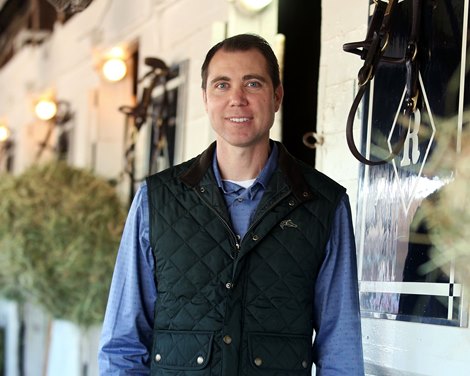Breeders' Cup Focuses on Safety, Extensive Testing


It was just about six months ago that Thoroughbred racing faced a dark moment in the long and storied history of the sport's most famous race.
The May 9 news that Kentucky Derby Presented by Woodford Reserve (G1) winner Medina Spirit tested positive for a banned substance rocked the entire industry to its core.
To date, the Kentucky Horse Racing Commission has yet to rule on whether the 3-year-old will be disqualified or trainer Bob Baffert sanctioned, but the shock waves have not been ignored.
With the Breeders' Cup set to be contested Nov. 5-6 at Del Mar, the World Championships will unfold under new and enhanced safety protocols, including comprehensive pre-race testing that is intended to discover a violation before the race and prevent a repeat of what happened at the Run for the Roses.
"That was one of the big driving forces behind this pre-competition testing we did this week," Dr. Will Farmer, a co-lead of the Breeders' Cup veterinary team, said Nov. 3 about the drug issue hanging over the Kentucky Derby. "Obviously, unlike for humans when you can go and have a blood test done in a matter of minutes, the blood testing that we do on horses is very complicated. It takes very extensive machinery and it's very time consuming. So it was a massive feat (to perform). (The staff at University of California-Davis) is working feverishly with all of the samples. We sent them 166 samples yesterday and they are basically trying to get us a 48-hour turnaround.
"So this is something that's never been done before. We've had to work through a lot of obstacles to get to this point, but the Breeders' Cup felt it was a step that could really help us. We can't prevent a positive finding, but if we can identify them prior to the race we felt it was a very good step forward for integrity."

Aside from the out-of-competition testing for all participants, there are specific protocols for Baffert's entrants, which includes the ability to take urine samples from his horses at any point through Saturday.
Speaking as part of a panel to discuss the health and safety protocols for the Breeders' Cup, Dr. Jeff Blea explained that starting at 72 hours before the race, Breeders' Cup entrants are subjected to 24-hour security.
"There's Breeders' Cup investigators all over the backside. There are California Horse Racing Board investigators. We have 11 on staff and they are operating 24 hours a day," said Blea, the CHRB equine medical director. "In addition to the monitoring and oversight by security and the Breeders' Cup staff, at 72 hours, any medication that is administered to a horse, the materials used for it are collected and bagged and identified. Paperwork is filled out and it is transported to a CHRB investigator where we are storing them, so that in case of a post-race positive we can go back and use it as evidence."
Following the 14 Breeders' Cup races there will be testing of the first four finishers as well as any other horse designated by the stewards.
Besides the integrity concerns raised by the Kentucky Derby, equine safety also will be a major focus this weekend.
The 38th Breeders' Cup marks the series' return to California for the first time since 2019 when the event at Santa Anita Park ended with a fatality in the Longines Breeders' Cup Classic (G1) as Mongolian Groom broke down. Blea said reforms have been instituted since then and have been embraced by the California racing community so that there are more vigorous pre-race checks for soundness.
"What happened in 2019 expediated reforms that were already underway in a rapid, rapid manner," Blea said. "As a sport, as an industry, we are very aware of the issues that went on in 2019, and stakeholders have embraced all of the recent reforms coming down the pipe.
"I can tell you, working with the Breeders' Cup and Del Mar, safety and welfare are the top priorities in racing today," he added, "and I think what's happened over the last few years, the changes, the reforms, not only with medication but safety, I think the industry, especially in California, we're keenly aware of our critics and at this stage we can pick our head up and tell a good story. If we take care of the horse, everything will take care of itself and I think the focus is on the horse."
Farmer said that after 2019, Dr. Larry Bramlage of Rood & Riddle Equine Hospital performed a review of the Breeders' Cup's protocols and suggested a trot-up exam to check for soundness.
"When we were able to have these horses in a confined area so that we could examine them with weight on their back rather en masse during training, that was one change that has been very well-received. As veterinarians we have been very excited by it. It has helped us to examine these horses better," Farmer said. "Another aspect of that has been that we have devoted a consistent veterinarian to examine those horses so we don't have a constant turnover of veterinarians. We used to focus heavily on barn exams and we've transitioned it to make it more of a split between barn exams and track exams."
Sadly, there was a fatality earlier in the day during training at Del Mar when Set the Tone , a 2-year-old maiden filly trained by Bob Hess Jr., lost her bridle and then dumped her rider and ran off. While trying to exit the track, she crashed into a pole, causing a severe shoulder injury. She was quickly treated by medical personnel, but could not be saved and was euthanized on the track.
On the human side, with COVID-19 still a concern, the Breeders' Cup and Del Mar announced unvaccinated individuals must wear face coverings over their nose and mouth indoors and outdoors when in close proximity to others. Planned attendance for the two-day event is 45,000, not including staff, credentialed media, sponsors, and vendors.
Guests entering the facility or placing a bet are asked to practice social distancing, and officials said they should refrain from congregating inside the grandstand and adhere to posted signage and floor decals.
